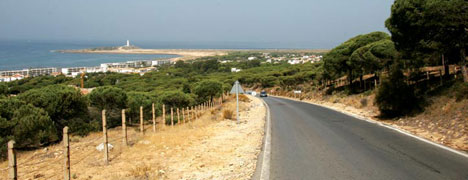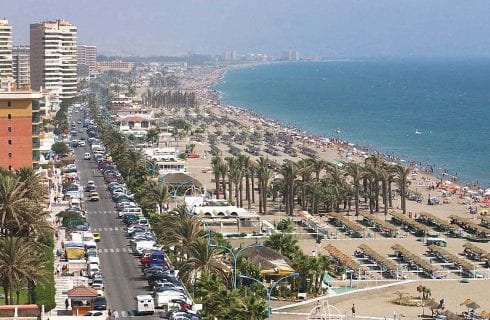
A new frontline is being drawn up along the Costa de la Luz, between developers and nature lovers who want to save one of its last unspoilt expanses. Feelings are running high on both sides of the divide and, as JON CLARKE reports, the area which was the scene of Nelson’s famous battle could be gearing up for a more modern-day confrontation. As has been the case in Ronda with the illegal Los Merinos golf scheme, can local protesters once again singe the developers beards?
VISIT El Palmar and beaches around the Trafalgar lighthouse on any weekend, and you will find surfers, kiteboarders and both young and old relaxing on the sands. Lined with a handful of thatched restaurants and bars, the fringes of the beaches – almost unlike anywhere else in Andalucia – are tree-lined and devoid of concrete expanses. It’s a relaxed ‘vibe’ that attracts precisely the people who don’t want five-star luxury, and the usual casinos and golf resorts that come with it.
But alarmingly, as the Olive Press has discovered, that lifestyle could now be under threat with a whole raft of plans on the drawing board for luxury hotels, housing projects and even, of course, golf courses.
The writing is sadly already on the wall. As we reported last issue, the council in Vejer has just made the controversial decision to ban the popular chiringuitos from El Palmar beach this summer. It is also clamping down on camper vans parked beside the beach.
As Thierry Lopez of Hostal La Gallega explains: “The mayor of Vejer seems to want to bring in a different kind of tourism – more upmarket. But four and five-star hotels would completely alter the character of the place.
“This is one of the last places left on the whole Andalucian coastline that isn’t entirely built on, so it is incredible to think – after what has been done everywhere else – that they will make the same mistake again.”
So what exactly is being planned for El Palmar and Trafalgar and what does ‘being cleaned up’ mean?
Sadly, the area looks to be in for a fairly drastic change. The development of this last underveloped part of the coastline is soon likely to begin.
At the northern end of El Palmar, beside the Castilnovo tower, for example, permission has already been given for two hotels with up to 580 rooms, a nine-hole golf course and a spa. The development by the Riera Marsá company was given the green light last year after several years of consultation and environmental studies which formed part of the planning process.
Thousands signed petition
The plans were strongly opposed by local environmental groups, including Ecologístas en Accion and the Conil-based heritage society, La Laja, which collected 11,000 signatures for a petition to save the area.
They claimed that Castilnovo was home to important species of flora and fauna which needed to be protected. The Environment Ministry of the Junta de Andalucía replied by saying that while parts of this particular stretch of coast were already protected, the rest had nothing that merited special measures.
La Laja has condemned the plans to build the hotel as “the first attack on what constitutes an important virgin space”.
Of course, the promoters insist it will be good for the area, dangling the normally used carrot that it will bring 300 jobs to the area, as did the Los Merinos golf scheme, recently shelved in Ronda. Insisting that it is a sensitive, low-level development of only two storeys and “at right angles to the beach”, there will be large areas of green space.
But José Manuel Herrera of the local environmental group Agaden is less convinced of its benefits. He insists the authorities should be encouraging a different kind of tourism – one that is not bound up with big hotel complexes.
“A development of this kind could spoil the very things which they should be using to sell the area,” he explains.
Similar to the recent halt at Los Merinos, the project is currently frozen due to a lack of finance, and environmentalists and opponents are hoping that the current economic crisis will kill off the development for good.
The developers remain more upbeat, explaining that while they are having to look abroad for backing for the 85 million euro project because the banks here have cut back on lending, there is still plenty of interest from tour operators.
Further south, at Trafalgar, another deal is expecting “imminent” approval. Leading to what one local paper (the Diario de Cádiz) has dubbed “the metamorphosis” of Trafalgar, huge German-based tour operator TUI and the Majorcan firm Hipotels are behind plans to build two four-star hotels with 600 rooms. Mostly aimed at the German market, this huge development will take place next to virgin sand dunes right opposite the lighthouse and has the provisional approval of the local council.
Barbate council has also earmarked another large piece of land called La Yeguada further inland for a second hotel development, but according to sources within the town hall, while there is interest there has so far been no deal struck.
But it’s not just the areas of El Palmar and Trafalgar which are being targeted, however. In between lies the rural zone of Mangueta. Here, large tracts of land have been bought up by a consortium, said to include the former Real Madrid president, Florentino Pérez.
No formal proposal has yet been put forward, but the initial draft of Vejer’s general town plan (PGOU) – still a long way off being approved – makes provision for various hotels and an 18-hole golf course in this area.
The situation along this coast is complicated, to say the least. The area round Mangueta, and also in El Palmar, are both places where illegally-built housing is widespread, and there have been some recent demolitions.
Understandably, the local councils are under pressure to step in to ‘regularise’ the situation and prevent mass demolitions.
Plans, for example, are already under way to urbanise 1.5 million square metres of land in El Palmar (or the equivalent of around 1,500 homes) with the possibility of a further one million square metres late
There is even – incredibly – the possible provision for a technology park.
The move has been strongly attacked by green group Ecologístas en Acción as “the triumph of illegality over the need for planning”.
“El Palmar is one of the few unspoiled beaches that remains on this part of the coast,” said spokeswoman Lola Yllescas. “They say this hotel will only have two floors – but any building in this area will have a huge impact. This is a really important area in terms of habitat for birds and plants.
“As for this argument about bringing jobs and money into the area – we’ve heard it all before, for 20 years we’ve been given this line and it’s not true. Look at the big hotels in Novo Sancti Petri, for example; of the 13 hotels there, only five stay open all year round. So for the majority of the year, these huge buildings are lying empty, unproductive, certainly not offering any employment.
“If the authorities want to boost the economy of the area, why don’t they put more money into the traditional sectors like agriculture and fishing? We’re delighted that this hotel at El Palmar is frozen at the moment – for once, the economy is on our side.”
But another local campaigning group, Vejer por el Desarrollo, says more should be done to encourage development – and therefore jobs – in the area. And in Barbate, a struggling fishing town where unemployment stands at 40%, protests have been held calling for more hotels to be built at Trafalgar.
“We’re trying to plough a middle way,” says Antonio Muñoz, the planning councillor at Vejer ayuntamiento. “On one hand you have people who say we should just let them build whatever they like, wherever they like; and on the other, the environmentalists who want no development at all.
“The reality is, El Palmar is not a virgin beach. We have to get some kind of control over what’s happening there.”
The economic and environmental arguments will continue. But what seems increasingly certain is that a change is going to come.
So how does Antonio Muñoz react to the charge that the council’s plans will alter the nature of this laid-back beach resort?
“What is already changing El Palmar is all the illegal building,” he says. “These people who have built there have no services, they dump their rubbish, they often have no proper system for sewage – it’s horrifying. There’s more of a threat from uncontrolled development than from authorised – but restricted – development. That’s what we’re trying to do.”
Expect the worst
With statements like these, like much of the Costa del Sol and other parts of the Mediterranean coastline too, you should expect to see some big construction plans laid down officially soon.
But developers, politicians and locals alike, would do well to heed the words of celebrity Hugh Cornwall, former singer in huge British band the Stranglers. “I like it at El Palmar precisely because it isn’t developed. It’s just in its natural state and so peaceful.
“There are so few places that are left untouched; this is an absolute gem and they just shouldn’t mess with it. It’s a special place – and after all, you don’t sell off the crown jewels, do you?”









The Spanish government could,if it wished, impose
‘superiorissimo’ standards for construction that
would restrain development, and remove it from the
‘camino’ for rapid access to riches occasioned by
cheap, minimal specification building standards.
Because the buyers are duped by sun,sand and booze
and easy credit, property design scrapes through
on minimum standards that appease the need for these qualities. Impose the rule that properties must ‘run off the sun’, with no utility imputs,
and development will slow to a walk in the woods.
Spain will reap what it sows.